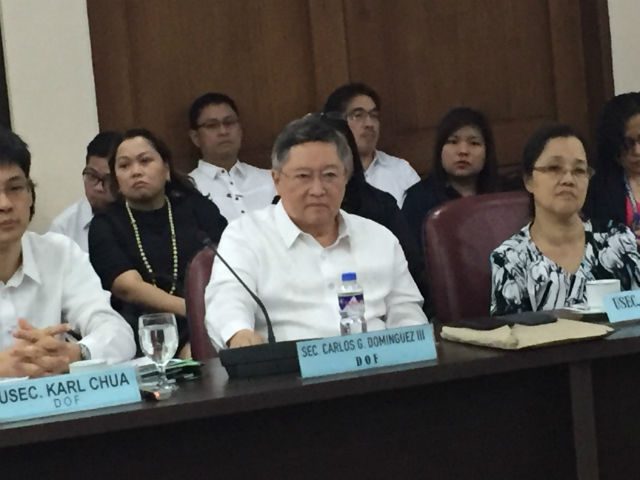SUMMARY
This is AI generated summarization, which may have errors. For context, always refer to the full article.

MANILA, Philippines (UPDATED) – “It’s in the Constitution, sir.”
Finance Secretary Carlos Dominguez III had to explain to Speaker Pantaleon Alvarez on Monday, March 6, why the government is not taxing the income that religious institutions are getting from schools’ tuition.
During a House ways and means committee hearing on the tax reform package of the Department of Finance (DOF), Alvarez asked: “‘Yun bang mga religious institutions, ‘pinagbabayad ‘nyo ng tax doon sa mga income not exclusively and directly used for religious purpose (Do you ask the religious institutions to pay taxes on their income not exclusively and directly used for religious purpose)?”
Dominguez replied that they do. Bureau of Internal Revenue (BIR) Commissioner Cesar Dulay further explained why.
“The revenue from tuition fees, they are not taxed… But they have revenue from commercial activities like rental of assets or property – those are taxed,” said Dulay.
Alvarez, however, is not buying it. He said that some religious institutions are not necessarily truthful when it comes to their income.
“Hindi, because I think they are registered as non-stock, non-profit. Kaya they are claiming exemptions from their educational income. Pero naniniwala ba tayo do’n? Ha? Kailangan tignan natin ito ha! Kasi kahit sino puwede mag-declare ng non-stock, non-profit para lang ‘di makapagbayad ng [tax],” said Alvarez.
(No, because I think they are registered as non-stock, non-profit. That’s why they are claiming exemptions from their educational income. But do we believe that? We need to look into this! Because anyone can declare that they are non-stock, non-profit so they don’t need to pay tax.)
“Itong mga schools na ‘to, they don’t cater to the poor. Palaging nag-i-increase ng tuition fees ‘yan. So ibig sabihin, hindi ‘yan non-stock, non-profit. Profitable business ‘yan, ‘yung mga eskuwelahan na ‘yan,” he added.
(These schools don’t cater to the poor. They always increase their tuition. So that means they’re not non-stock, non-profit. These schools are profitable businesses.)
Alvarez, a graduate of the Ateneo Law School who practiced law from 1984 to 1986, then asked Dominguez their basis for the non-taxation of religious schools when it comes to tuition.
“It’s in the Constitution, sir,” was Dominguez’s reply.
Section 4, Article XIV of the 1987 Constitution states: “All revenues and assets of non-stock, non-profit educational institutions used actually, directly and exclusively for educational purposes shall be exempt from taxes and duties.”
To clarify his point, Dominguez cited Ateneo de Davao University, saying the university is taxed for its commercial properties being rented to companies like National Bookstore, but not for its income from tuition.
Executive session
Still, Alvarez insisted the BIR submit to the House the income tax returns of all religious institutions in the country in the past 3 years.
Dulay agreed, but requested that his presentation be made during an executive session with congressmen. This was granted by House ways and means panel chairperson Dakila Cua.
Alvarez denied he brought up the taxes of religious institutions during the hearing following the Church’s opposition against some of the administration’s policies, including the war on drugs and the revival of the death penalty. (READ: CBCP hits death penalty: ‘No person beyond redemption’)
“Hindi naman Simbahang Katoliko lang. Sa lahat ng religious institutions,” said the Speaker in a chance interview after the hearing.
(It’s not just about the Catholic Church. This involves all religious institutions.)
“Eh bakit itong mga run by religious institutions, ang mamahal ng tuition fees tapos libre ‘yung income tax? ‘Di ba ano ‘yun, ‘di ba unfair naman ‘yun sa ibang institutions?” said Alvarez.
(Why do these religious institutions have expensive tuition then their income tax is free? Isn’t that unfair to other institutions?)
He said the public should take the perspective that he is merely doing his part to “fix the system of taxation” in the country. – Rappler.com
Add a comment
How does this make you feel?
There are no comments yet. Add your comment to start the conversation.